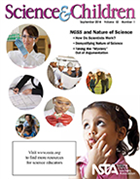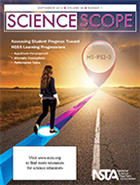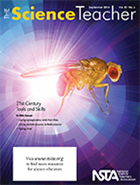NGSS and 21st century tools and skills
By Mary Bigelow
Posted on 2014-09-23
One of the perks of being an NSTA member is having access to all of the journals online. Regardless of the grade level you teach, the journals have ideas for authentic activities and investigations that can be used, adapted, or extended for different levels of student interest and experience.
In NSTA’s September K-12 journals, the overarching theme seems to be rethinking and expanding traditional learning experiences. The articles have ideas for helping students incorporate different ways of thinking and learning via activities incorporating the NGSS and 21st century technology applications.
Keep reading for more from Science & Children, Science Scope, and The Science Teacher.
 Science & Children: NGSS and Nature of Science
Science & Children: NGSS and Nature of Science
The articles look beyond our previous teaching of THE scientific method to show how students can be involved in their own authentic explorations and discoveries. Here are some SciLinks that are connected to the content topics in several of the the articles:
- Teaching Through Trade Books: How Do We Know What We Know About the Universe? [Solar System Formation, Moon Phases, Astronomy]
- The Nature of Science in Early Childhood [Inference]
- Demystifying Nature of Science [Inference]
- Taking the “Mystery” Out of Argument [Characteristic Properties of Matter, How can Physical Properties Be Used to Identify Matter?]
- Three, Two, One…Blast Off! [Rocket Technology, Rocketry]
- Integrating the Nature of Science [Animal Camouflage, Predator/Prey, Populations, Communities, and Ecosystems]
- Sculpt-a-Scientist [Careers in Science]
- How Do Scientists Work? [Inference]
 Science Scope: Assessing Student Progress Toward NGSS Learning Progressions
Science Scope: Assessing Student Progress Toward NGSS Learning Progressions
Assessment is an integral part of the learning process. Many of the lessons described in this issue use the 5E model (which has an Evaluate component congruent with the learning goals and activities) and describe ways to expand our assessment repertoires with performance tasks, learning progressions, pre-assessments, alternate conceptions, journaling, and self-assessment, and observation. Here are some SciLinks that are connected to the content topics in several of the the articles:
- Magnetism: More Than Just Objects Attracted to Refrigerators [Magnetic Materials, Magnetic Fields]
- Assessing Student Progress Along a Solar System Learning Progression [Origins of the Solar System]
- Just Do It! Performance Tasks in the Science Classroom [Plate Tectonics, Landforms]
- Gearing Up for Engineering [Forces, Simple Machines]
- Including Often-Missed Knowledge and Skills in Science Assessments [Ecosystems, Food Webs]
- Tried and True: What’s the Matter? Looking Beyond the Macroscopic [Types of Chemical Bonds, Matter]
If you’re interested in reading Developing Assessments for the Next Generation Science Standards from the National Research Council, you can download a PDF of the document at no charge.

The Science Teacher: 21st Century Tools and Skills
In 2014, we are well into the 21st century, and technology tools continue to evolve. The articles illustrate how these tools can enhance student learning, keeping in mind that in their future students will use tools that haven’t been invented yet. Having a foundation of basic skills with which to use the tools is critical. Here are some SciLinks that are connected to the content topics in several of the the articles:
- Using Mobile Devices in Field Science [Herpetology, Reptiles, Amphibians]
- Lights and Larvae [Genetic Engineering/Recombinant DNA]
- The Green Room: Too Much of a Good Thing [Eutrophication]
- Going Viral [Viruses]
- Cellulose Breakdown [Alternative Fuels]
This issue is the debut of a new column. Right to the Source: Exploring Science and History with the Library of Congress features descriptions of and links to primary source documents digitized by the Library of Congress. This month features communications between Alexander Graham Bell and Guglielmo Marconi.
Disclaimer: The views expressed in this blog post are those of the author(s) and do not necessarily reflect the official position of the National Science Teaching Association (NSTA).


